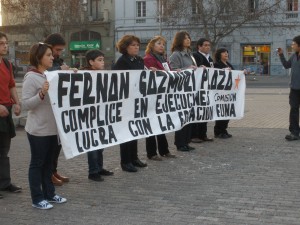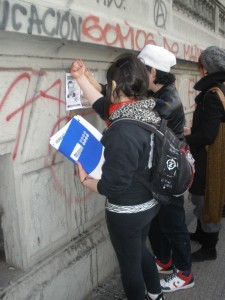Hay FUNA!
What is that? At least that was what my English inner monologue was asking myself as I heard the word multiple times in Julio’s Spanish. I was sitting in Londres 38, a once socialist party headquarters during the early 70′s in Santiago Chile, turned detention/torture center. Julio, a presenter speaking to our class was telling me something about a FUNA but Professor Lazzara had yet to translate exactly what it was. A FUNA is a form of social justice. A group, they work pretty anonymously, receives tips about people who could have been involved in any human rights violations during the dictatorship. Extensive research was done on the person and anything they discovered would be typed up and printed on pamphlets that would be later passed around the accused’s neighborhood or place of work. That way everyone would know the actions of the person living or working near them. A form of social justice that was intended to make the individual feel ostracised in their own elements.
Julio told us that the next evening, Friday, there would be a FUNA that he wanted to invite the class to. The next afternoon my roommate and I found ourselves wandering around the Los Hereos park looking for any sign of an organizing FUNA. We had just about given up when we saw a small group of people unrolling signs had gathered near a statue. as we walked over people passed us a pamphlet that told us about the man we were going to visit in his place of business. He was a business owner during the dictatorship and he turned over six men to the DINA, the secret police of Augusto Pinochet. To this day all six of them are still disappeared.
Very soon we started marching around the square and along the business areas near the man’s place of business. The next thing I saw were young, 13 or 14 year olds running along the group plastering the walls with pamphlet print outs with glue from 3 liter (that’s right, 3 liter cokes in Chile) Coke Cola bottles with the tops cut off. The crowd was singing and there was a sense of excitement in the air. And in the best broken Spanish I could, I found myself shouting out the words, though I’m not sure exactly what I was saying. I asked for some papers and joined the others in passing them out to those the group walked by.
Then we were at the man’s office and we shouted and sang loudly. The group littered the floors of the lobby with the remaining pamphlets. There was a silence and Julio read the actions of the man out loud over the mega phone. It was very peaceful, the traffic stopped and the police just drove by, they knew in advance what was going to happen. And then it was over. We marched back and the crow, as quickly as it gathered, dispersed.
Victoria Martin is a graduating senior in RST and is among the first to earn a minor in Human Rights. She is planning to take some time off from school to teach English in another country before returning to graduate school. She hopes to go to UC Santa Barbara to earn her masters in International Relations with an emphasis in Human Rights. She is also excited to take the time off to continue her own research on genocide.


